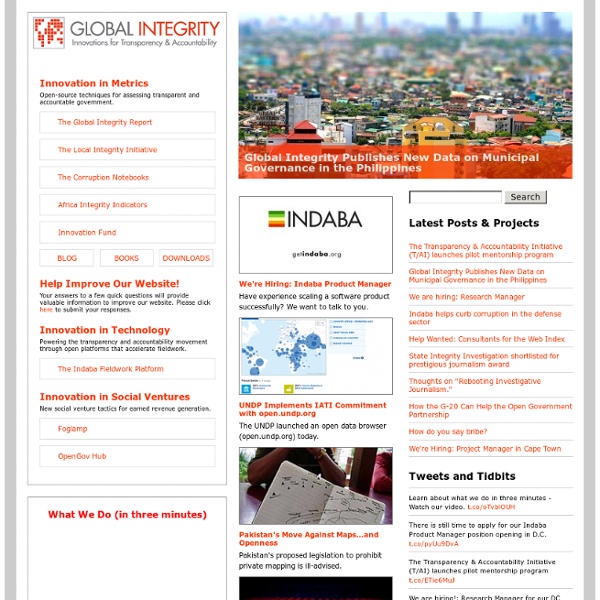



I Am Awake Project | The 5th Element L’heure de l’open démocratie? Le Social média club rennais s’est penché lundi 23 avril 2012, sur l’idée de la démocratie ouverte. Dans un contexte d’élection présidentielle, le but était de parler de ce concept, venu du mouvement open data, et de son avenir en France. Pour aborder l’open démocratie, deux intervenants étaient au programme. Simon Chignard, auteur de « l’open data, comprendre l’ouverture des données publiques« , a tout d’abord rappelé les origines du mouvement open data et ses promesses en matière politique. Par la suite, Céline Mounier, sociologue à la Direction de l’innovation commerciale d’Orange France et Laurence Dhaleine, sociologue à Orange Labs, ont fait écho d’une expérience conduite par Orange. Le podcast de la conférence : < !
The Open Data Foundation LDMG | Legal Defence & Monitoring Group Comment l’open data est devenu un objet politique … Le 1er jour d’Obama (photo The White House) Le 21 janvier 2009, le 44 ème président des Etats-Unis prend ses fonctions. Barack Obama signe ce jour-là trois mémorandums, dont deux concernent le gouvernement ouvert et la transparence. Près d’un an avant l’entrée en fonction d’Obama, un groupe d’une trentaine d’activistes et de praticiens de l’open government se sont retrouvés à Sebastopol en Californie, à l’invitation de Tim O’Reilly et de Carl Malamud. Ils ont défini l’open government data … (photo David Orban) L’invitation mentionnait déjà l’ambition de la rencontre : définir les principes de l’open data et, si possible, les faire adopter par les candidats à l’élection présidentielle qui devait se dérouler l’année suivante. La photographie du groupe ressemble à un Who’s Who de l’open government et du mouvement free culture. Le Who’s Who de l’open government (photo David Orban) Richard Stallman (photo Victor Powell) ACTE 4 - (OPEN GOV) DATA ou OPEN (GOV DATA) ? Like this: J'aime chargement…
Partnership for Transparency Fund - Supporting Citizens Against Corruption The Economics of Happiness (2011) Economic globalization has led to a massive expansion in the scale and power of big business and banking. It has also worsened nearly every problem we face: fundamentalism and ethnic conflict; climate chaos and species extinction; financial instability and unemployment. There are personal costs too. For the majority of people on the planet life is becoming increasingly stressful. We have less time for friends and family and we face mounting pressures at work. The Economics of Happiness describes a world moving simultaneously in two opposing directions. We hear from a chorus of voices from six continents including Vandana Shiva, Bill McKibben, David Korten, Michael Shuman, Juliet Schor, Zac Goldsmith and Samdhong Rinpoche - the Prime Minister of Tibet's government in exile.
What data can and cannot do In the early days of photography there was a great deal of optimism around its potential to present the public with an accurate, objective picture of the world. In the 19th century pioneering photographers (later to be called photojournalists) were heralded for their unprecedented documentary depictions of war scenes in Mexico, Crimea and across the US. Over a century and a half later – after decades of advertising, propaganda, and PR, compositing, enhancement and outright manipulation – we are more cautious about seeing photographs as impartial representations of reality. Photography has lost its privileged position in relation to truth. The current wave of excitement about data, data technologies and all things data-driven might lead one to suspect that this machine-readable, structured stuff is a special case. Data can be an immensely powerful asset, if used in the right way. Data is not a force unto itself. Please let us know what you think in the comments below.
Transparent Chennai Information that Society Needs to Wake the Fu*k Up The current state of humanity’s reality is one big cluster-fu@k, as well as a mystical dream. However, some of the people who are disengaging from ‘mainstream programming’, ‘social engineering’ and are waking up to the realities of our world, have only awoken to one side of the equation. Therefore, this list serves as a reminder of both the educational and conceptual ‘awakenings’ that need to occur on a widespread scale to transform our social systems into their new stage of evolution. Our future generations are depending on us not being asleep at the wheel. Regardless of how challenging at first it is to take in, when we do the ‘proper’ research, we understand that: 1. 2. 3. 4. 5. 6. 7. 8. 9. 10. 11. 12. 13. 14. 15. 16. Once we look into why this is happening, we begin to see scattered patterns of information that indicate more or less the following: 17. 18. 19. 20. 21. 22. 23. 24. 25. 26. 27. 28. 29. 30. 31. 32. 33. 34. 35. 36. 37. 38. 39. 40. 41. 42. Sounds out of control right? 43. 44.
l’Open Data, la démocratie retrouvée ? Interrogez les Français ! Ils trouvent nos politiques déconnectés de la réalité. Les français connaissent peu le travail parlementaire ; trouvent notre institution politique compliquée. L’Open Data, est un usage numérique récent qui permet la réconciliation avec nos institutions. Et qui va dans le sens de notre modernité : transparence, démocratie. Focus ! L’open data est la publication d’informations publiques, à utilité publique, et de manière la plus large. 1. L’open data est une publication d’information brute. La publication de ces informations permet la transparence : Plutôt que de considérer le citoyen comme "idiot", non compétent, on considère qu’il a droit à être informé. Par les forums, ou par la publication intégrale des articles de loi. 2. Les nouvelles technologies, portées par les services publiques ne doivent pas se résumer à des considération purement techniques. Voter via des machines électroniques est encore peu répandu. Mais en accédant directement à la donnée brute.
Pando Populus | We're all connected